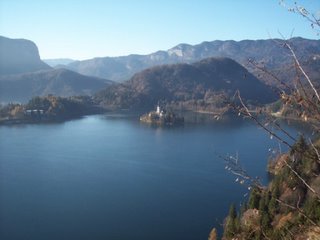
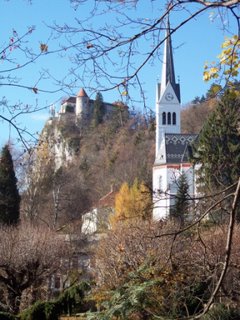 Last days in Slovenia - went for an interesting excursion to Bled and also to Skofja Loka.
Last days in Slovenia - went for an interesting excursion to Bled and also to Skofja Loka.Slovenia has only one island; sheltered by picturesque mountains, the island reigns in the middle of an Alpine lake. The town of Bled has already existed for a thousand years. On the island in the middle of the lake, the ancient Slavs worshipped Živa, goddess of love and fertility. Pilgrims later came to the church of St Mary on the island. A thousand years ago, on 10 April 1004, the town of Bled was mentioned for the first time when the Holy German emperor, Henry II, gifted it to the Bishop of Brixen. At that distant time, a Roman tower already stood at the top of the cliff rising vertically 100 m above the lake, and it still forms part of the castle. The town flourished in the Middle Ages due to pilgrims, and these were replaced in the 19th century by the first tourists. The Swiss hydropathist, Arnold Rikli, discovered that the gentle climate and the lake and thermal waters are a source of good health and well-being. The local people supplemented the health spa offer with guest houses and hotels.
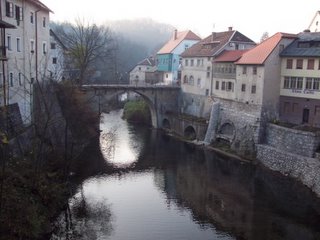 Škofja Loka, a thousand-year-old city at the confluence of the Poljanska Sora and Selška Sora rivers, was the center of the Loka dominion owned for 830 years by the Bishops of Freising, who placed an indelible stamp on the city. The old city core boasts numerous points of interest from the past, and the Loška Castle, built before 1202, reigns above the city. Škofja Loka is considered the most beautifully preserved medieval city in Slovenia.
Škofja Loka, a thousand-year-old city at the confluence of the Poljanska Sora and Selška Sora rivers, was the center of the Loka dominion owned for 830 years by the Bishops of Freising, who placed an indelible stamp on the city. The old city core boasts numerous points of interest from the past, and the Loška Castle, built before 1202, reigns above the city. Škofja Loka is considered the most beautifully preserved medieval city in Slovenia.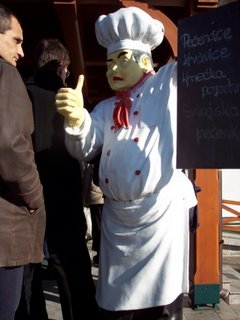 Lunch was interesting... you know I mentioned pony meat before... well we had foal at lunch time... maybe that explains the funny face on this dude!
Lunch was interesting... you know I mentioned pony meat before... well we had foal at lunch time... maybe that explains the funny face on this dude!The photo below is Predjama Castle, which is another stunning castle. The castle perches on a vertical cliff 123 metres high; behind it is an extensive system of underground passageways with various hidden exits and a supply of running water. It is an almost impregnable fortress. An old legend tells of how in the 15th century the castle’s last owner, the robber baron Erazem, was finally defeated by treachery—struck by a cannonball as he sat on the toilet. For months he had been taunting his besiegers, even sending down fresh fruit, which the castle was always supplied with thanks to its secret underground passages and corridors.
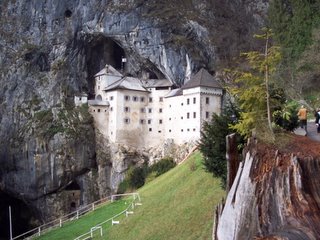
No comments:
Post a Comment